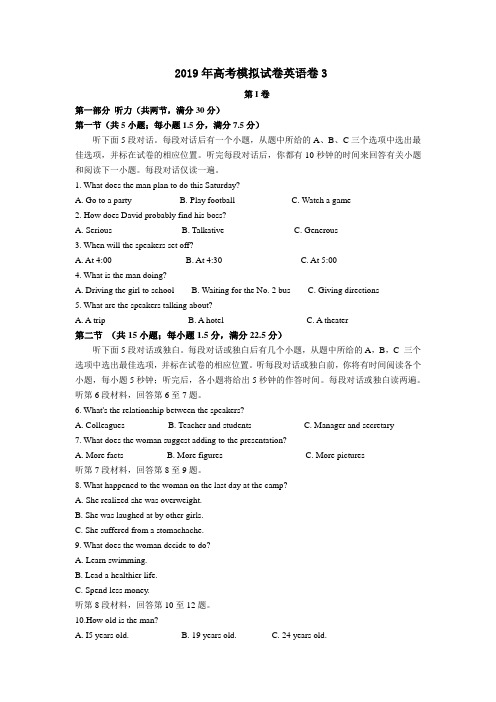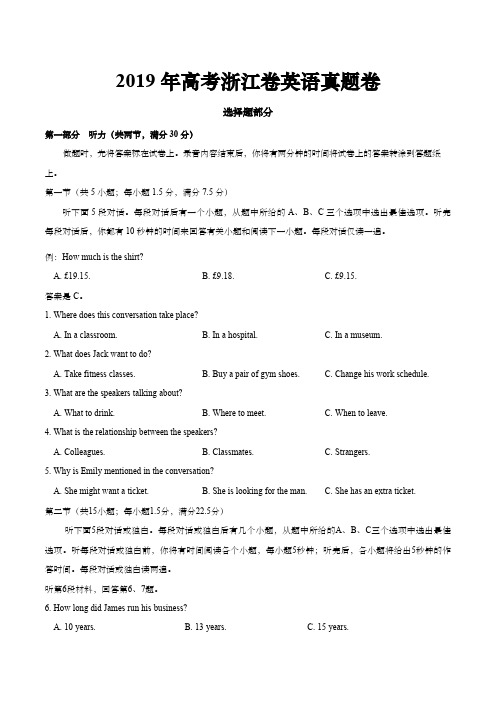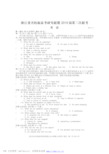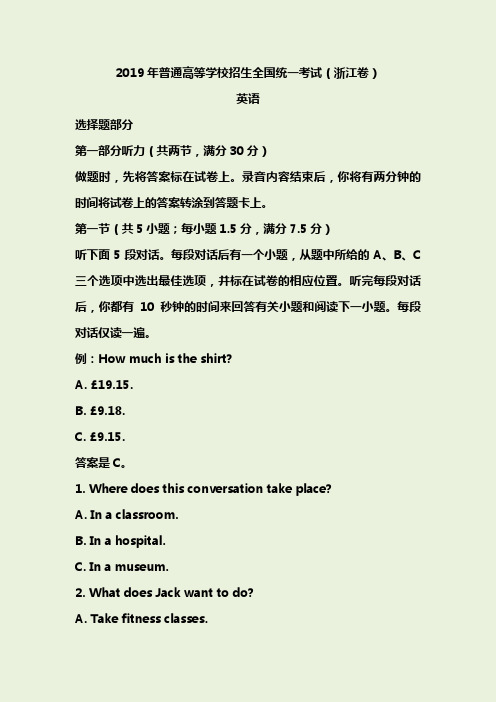2019年1月卷浙江省新高考研究卷 英语试题(三)
浙江省2019届高三英语第三次联考试题(含解析)

浙江省2019届高三英语第三次联考试题(含解析)考生须知:1. 本卷共 8 页,满分 150 分,考试时间 120 分钟;2. 答题前,在答题卷指定区域填写班级、姓名、考场号、座位号及准考证号;3. 所有答案必须写在答题卷上,写在试卷上无效;4. 考试结束后,只需上交答题卷。
第I 卷第一部分:听力(共两节,满分 30 分)做题时,先将答案标在试卷上。
录音内容结朿后,你将有两分钟的时间将试卷上的答案转涂到答题卡上。
第一节 (共 5 小题;每小题 1.5 分,满分 7.5 分)听下面 5 段对话。
每段对话后有一个小题,从题中所给的 A、B、C 三个选项中选出最佳选项。
听完每段对话后,你都有 10 秒钟的时间来回答有关小题和阅读下一小题。
每段对话仅读一遍。
1.What does the man do?A. An artist.B. A house painter.C. A cleaner.【答案】B【解析】【详解】M: If you can make up your mind about the color, I can start on the outside of your house next Monday.W: Well, right now I think I want white for the door and light green for the wall, but I haven’t decided yet.2.When will the boy go to bed?A. At 9:40.B. At 9:50.C. At 10:10.【答案】C【解析】【详解】W: Go to bed, Tom. It’s already twenty to ten.M: Aw, Mum, just a few minutes. I’m watching this TV program. It’ll be over soon and I’ll be in bed in 30 minutes.3.What does the boy’s new history teacher look like?A. She has red hair.B. she is tall.C. She is quite short.【答案】B【解析】【详解】M: Oh look! That’s my history teacher over there.W: The one with yellow hair? You always told me your teacher was a short woman with red hair.M: That was the teacher I had before. My new history teacher is tall and wears cool glasses.4.Why does the man refuse the woman? A. His car just broke down.B. He’ll use his car. C. She can’t drive.【答案】B 【解析】【详解】W: Would you mind if I borrowed your car just over the weekend?M: I’m sorry, but it’s just not possible, because I’m going to the countryside this weekend.5.Where is the No.1 Hospital?A. Across from a bank.B. On Zhongshan Street.C. At the end of 5th Street.【解析】【详解】W: Excuse me, officer. How do I get to the NO.1 Hospital?M: Cross Zhongshan Street and turn left. Go on one block on 5th Street and you’ll see the building opposite a bank.第二节(共 15 小题;每小题 1.5 分,满分 22.5 分)听下面 5 段对话或独白。
浙江省杭州市2019届高三高考命题比赛英语试题Word版含答案3

2019年高考模拟试卷英语卷3第I卷第一部分听力(共两节,满分30分)第一节(共5小题;每小题1.5分,满分7.5分)听下面5段对话。
每段对话后有一个小题,从题中所给的A、B、C三个选项中选出最佳选项,并标在试卷的相应位置。
听完每段对话后,你都有10秒钟的时间来回答有关小题和阅读下一小题。
每段对话仅读一遍。
1. What does the man plan to do this Saturday?A. Go to a partyB. Play footballC. Watch a game2. How does David probably find his boss?A. SeriousB. TalkativeC. Generous3. When will the speakers set off?A. At 4:00B. At 4:30C. At 5:004. What is the man doing?A. Driving the girl to schoolB. Waiting for the No. 2 busC. Giving directions5. What are the speakers talking about?A. A tripB. A hotelC. A theater第二节(共15小题;每小题1.5分,满分22.5分)听下面5段对话或独白。
每段对话或独白后有几个小题,从题中所给的A,B,C 三个选项中选出最佳选项,并标在试卷的相应位置。
听每段对话或独白前,你将有时间阅读各个小题,每小题5秒钟;听完后,各小题将给出5秒钟的作答时间。
每段对话或独白读两遍。
听第6段材料,回答第6至7题。
6. What's the relationship between the speakers?A. ColleaguesB. Teacher and studentsC. Manager and secretary7. What does the woman suggest adding to the presentation?A. More factsB. More figuresC. More pictures听第7段材料,回答第8至9题。
2019年浙江卷 英语真题(解析版)

2019年浙江卷英语真题(解析版)选择题部分第一部分听力(共两节,满分30分)做题时,先将答案标在试卷上。
录音内容结束后,你将有两分钟的时间将试卷上的答案转涂到答题纸上。
第一节 (共5小题;每小题1.5分,满分7.5分)听下面5段对话。
每段对话后有一个小题,从题中所给的A、B、C三个选项中选出最佳选项。
听完每段对话后,你都有10秒钟的时间来回答有关小题和阅读下一小题。
每段对话仅读一遍。
1.Where does this conversation take place?A. In a classroom.B. In a hospital.C. In a museum.【答案】B【详解】W: Excuse me, sir, visiting hours are over now. Your wife must get some rest.M: Oh, I’m sorry, doctor. I didn’t hear the bell, or I would’ve left earlier.2.What does Jack want to do?A. Take fitness classes.B. Buy a pair of gym shoes.C. Change his work schedule.【答案】A【详解】M: Hello, my name is Jack. I need to get in shape. How do I register for the classes?W: We’ll need you to join the gym,and then you can find out which classes fit your schedule the best.3.What are the speakers talking about?A. What to drink.B. Where to meet.C. When to leave.【答案】B【详解】W: I’ll see you at the theatre.M: Better still, let’s meet in the Red Lion bar to have a little nice talk.W: Good idea, and I’d love to have a drink there.4.What is the relationship between the speakers?A. Colleges.B. Classmates.C. Strangers.【答案】C【详解】M: Hello, my name is John Arber. And I’m calling to ask about the position advertised in Friday’s Dailymail.W: Yes, the position is still open. You could come over and have a talk with us.5.Why is Emily mentioned in the conversation?A. She might want a ticket.B. She is looking for the man.C. She has an extra ticket.【答案】A【详解】M: I have an extra ticket to the concert tonight. Would you like to join me?W: Thanks, but I already have one. You can ask Emily. She might be interested.第二节(共15小题,每小题1.5分,满分22.5分)听下面5段对话或独白。
2019年高考浙江卷英语真题卷(含答案)

2019年高考浙江卷英语真题卷选择题部分第一部分听力(共两节,满分30分)做题时,先将答案标在试卷上。
录音内容结束后,你将有两分钟的时间将试卷上的答案转涂到答题纸上。
第一节(共5小题;每小题1.5分,满分7.5分)听下面5段对话。
每段对话后有一个小题,从题中所给的A、B、C三个选项中选出最佳选项。
听完每段对话后,你都有10秒钟的时间来回答有关小题和阅读下一小题。
每段对话仅读一遍。
例:How much is the shirt?A. £19.15.B. £9.18.C. £9.15.答案是C。
1. Where does this conversation take place?A. In a classroom.B. In a hospital.C. In a museum.2. What does Jack want to do?A. Take fitness classes.B. Buy a pair of gym shoes.C. Change his work schedule.3. What are the speakers talking about?A. What to drink.B. Where to meet.C. When to leave.4. What is the relationship between the speakers?A. Colleagues.B. Classmates.C. Strangers.5. Why is Emily mentioned in the conversation?A. She might want a ticket.B. She is looking for the man.C. She has an extra ticket.第二节(共15小题;每小题1.5分,满分22.5分)听下面5段对话或独白。
浙江省名校新高考研究联盟(Z20联盟)2019届高三第三次联考试题 英语

浙江省名校新高考研究联盟2019届第三次联考英语2019.5第一部分:听力(共两节,满分30分)第一节(共5小题;每小题1.5分,满分7.5分)听下面5段对话。
每段对话后有一个小题,从题中所给的A、B、C三个选项中选出最佳选项,并标在试卷的相应位置。
听完每段对话后,你都有10秒种的时间来回答有关小题和阅读下一小题。
每段对话仅读一遍。
()1.What did the man do yesterday?A.He went to basketball practice.B.He went to the office.C.He saw a doctor.()2.What does the man want to do?A.Open a checking account.B.Start a savings account.C.Apply for a credit card.()3.What will the weather be like this weekend?A.Wet.B.Dry.C.Snowy.()4.What’s the relationship between the speakers?A.Interviewee and interviewer.B.Passenger and taxi driver.C.Strangers.()5.What does the woman mean?A.She has to leave.B.She wants more tea.C.She will call the man back.第二节(共15小题;每小题1.5分,满分22.5分)听下面5段对话或独白。
每段对话或独白后有几个小题,从题中所给的A、B、C三个选项中选出最佳选项,并标在试卷的相应位置。
听每段对话或独白前,你将有时间阅读各个小题,每小题5秒钟;听完后,各小题将给出5秒钟的作答时间。
每段对话或独白读两遍。
2019高考浙江卷英语真题、答题卡、答案(16开、免排版、可编辑)

绝密★启用前2019年普通高等学校招生全国统一考试英语(浙江卷)选择题部分第一部分听力(共两节,满分30分)做题时,先将答案标在试卷上。
录音内容结束后,你将有两分钟的时间将试卷上的答案转涂到答题卡上。
第一节(共5小题;每小题1.5分,满分7.5分)听下面5段对话。
每段对话后有一个小题,从题中所给的A、B、C三个选项中选出最佳选项。
听完每段对话后,你都有10秒钟的时间来回答有关小题和阅读下一小题。
每段对话仅读一遍。
例:How much is the shirt?A. £19.15.B. £9.18.C. £9.15.答案是C。
1.Where does this conversation take place?A. In a classroom.B. In a hospital.C.In a museum.2.What does Jack want to do?A. Take fitness classes.B. Buy a pair of gym shoes.C. Change his work schedule.3.What are the speakers talking about?A. What to drink.B. Where to meet.C. When to leave.4.What is the relationship between the speakers?A. Colleges.B. Classmates.C. Strangers.5.Why is Emily mentioned in the conversation?A. She might want a ticket.B. She is looking for the man.C. She has an extra ticket.第二节(共15小题,每小题1.5分,满分22.5分)听下面5段对话或独白。
2019年浙江卷英语高考真题(3)(2021年整理)

(完整)2019年浙江卷英语高考真题(3)(word版可编辑修改)编辑整理:尊敬的读者朋友们:这里是精品文档编辑中心,本文档内容是由我和我的同事精心编辑整理后发布的,发布之前我们对文中内容进行仔细校对,但是难免会有疏漏的地方,但是任然希望((完整)2019年浙江卷英语高考真题(3)(word版可编辑修改))的内容能够给您的工作和学习带来便利。
同时也真诚的希望收到您的建议和反馈,这将是我们进步的源泉,前进的动力。
本文可编辑可修改,如果觉得对您有帮助请收藏以便随时查阅,最后祝您生活愉快业绩进步,以下为(完整)2019年浙江卷英语高考真题(3)(word版可编辑修改)的全部内容。
2019年6月普通高等学校招生全国统一考试(浙江卷)英语选择题部分第一部分听力(共两节,满分30分)做题时,先将答案标在试卷上.录音内容结束后,你将有两分钟的时间将试卷上的答案转涂到答题卡上.第一节(共5小题;每小题1。
5分,满分7.5分)听下面5段对话。
每段对话后有一个小题,从题中所给的A、B、C三个选项中选出最佳选项。
听完每段对话后,你都有10秒钟的时间来回答有关小题和阅读下一小题.每段对话仅读一遍。
例:How much is the shirt?A. £19。
15。
B。
£9。
18。
C. £9。
15。
答案是C。
1。
Where does this conversation take place?A。
In a classroom. B。
In a hospital. C。
In a museum.2。
What does Jack want to do?A. Take fitness classes.B。
Buy a pair of gym shoes.C. Change his work schedule.3.What are the speakers talking about?A. What to drink.B. Where to meet。
2019年【浙江卷】英语试题+答案

2019年普通高等学校招生全国统一考试(浙江卷)英语选择题部分第一部分听力(共两节,满分30分)做题时,先将答案标在试卷上。
录音内容结束后,你将有两分钟的时间将试卷上的答案转涂到答题卡上。
第一节(共5小题;每小题1.5分,满分7.5分)听下面5段对话。
每段对话后有一个小题,从题中所给的A、B、C 三个选项中选出最佳选项,并标在试卷的相应位置。
听完每段对话后,你都有10秒钟的时间来回答有关小题和阅读下一小题。
每段对话仅读一遍。
例:How much is the shirt?A. £19.15.B. £9.18.C. £9.15.答案是C。
1. Where does this conversation take place?A. In a classroom.B. In a hospital.C. In a museum.2. What does Jack want to do?A. Take fitness classes.B. Buy a pair of gym shoes.C. Change his work schedule.3. What are the speakers talking about?A. What to drink.B. Where to meet.C. When to leave.4. What is the relationship between the speakers?A. Colleagues.B. Classmates.C. Strangers.5. Why is Emily mentioned in the conversation?A. She might want a ticket.B. She is looking for the man.C. She has an extra ticket.第二节(共15小题;每小题1.5分,满分22.5分)听下面5段对话或独白。
- 1、下载文档前请自行甄别文档内容的完整性,平台不提供额外的编辑、内容补充、找答案等附加服务。
- 2、"仅部分预览"的文档,不可在线预览部分如存在完整性等问题,可反馈申请退款(可完整预览的文档不适用该条件!)。
- 3、如文档侵犯您的权益,请联系客服反馈,我们会尽快为您处理(人工客服工作时间:9:00-18:30)。
名校联盟★《新高考研究卷》2019年1月卷《浙江省新高考研究卷》英语(三)本试卷分第I卷(选择题)和第Ⅱ卷(非选择题)。
考试结束后,将本试卷和答题卡一并交回。
注意事项:1.答第I卷前,考生务必将自己的姓名、准考证号填写在答题卡上。
2.选出每小题答案后,用铅笔把答题卡上对应题目的答案标号涂黑。
如需改动,用橡皮擦干净后,再选涂其他答案标号。
不能答在本试卷上,否则无效。
第Ⅰ卷第一部分:听力(共两节,满分30分)第一节:(共5小题;毎小题1.5分,满分7.5分)听下面5段对话。
每段对话后有一个小题,从题中所给的A、B、C三个选项中选出最佳选项,并标在试卷的相应位置。
听完每段对话后,你都有10秒钟的时间来回答有关小题和阅读下一小题。
每段对话仅读一遍。
1.Where did the man go finally?A.To the airport.B.To the doctors.C.To the company.2.What is the weather like now?A.Rainy.B.Fine.C.Snowy.3.How many students are there in the man’s college?A.About300.B.More than600.C.More than700.4.What can we learn about Mr Liu?A.He didn’t give a lesson today.B.He usually speaks excitedly.C.He usually gives home.5.What is the man angry about?A.Some women drivers.B.Phoning while driving.C.Too many traffic lights.第二节(共15小题;每小题1.5,满分2.5分)听下面5段对话或独白。
每段对话或独白后有几个小题,从题中所给的A、B、C三个选项中选出最佳选项,并标在试卷的相应位置。
听每段对话或独白前,你将有时间阅读各个小题,每小题5秒钟,听完后,各小题将给出5秒钟的作答时间。
每段对话或独白读两遍。
听第6段材料,回答第6~7题。
6.What is true about the man?A.He has lost interest in jazz.B.He works in the student center.C.He is a full-time student.7.Why did the man decide not to stay with the band?A.He didn’t like the band leader.B.He was too busy to make it.C.He wanted to join a better band.听第7段材料,回答第8~10题。
8.Why does the woman ask the man for help?A.She is organizing a party.B.She is not feeling well.C.She has to go shopping.9.Why doesn’t the man agree to help the woman?A.He has a date on Friday.B.He doesn’t want to work.C.He doesn’t like the woman.10.How does the woman probably feel about the man’s refusal?A.Indifferent.B.Relaxed.C.Disappointed.听第8段材料,回答第11~13题。
11.What are the speakers mainly talking about?A.basketball play.B.A football player.C.A baseball player.12.What do we know about Tom?A.He is to retire due to injuries.B.His girlfriend is a beautiful singer.C.He is great at basketball and football.13.What can we learn from the conversation?A.James is also a good football player.B.Jordan ever played a shooting guard.C.Tom is too old to play in big games.听第9段材料,回答第14~16题14.Why do Chinese people often drink hot tea in summer?A.To improve the health.B.To relieve the thirst.C.To balance the body system.15.When did the tea become popular in China?A.From the3rd century.B.From the4th century.C.From the14th century.16.What can we learn from the conversation?A.The woman knows a lot about Chinese tea.B.Few people like Chinese tea in Britain.C.All kinds of Chinese tea can help you lose weight.听第10段材料,回答第17~20题。
17.How many types of customers are mentioned in the talk?A.Three.B.Four.C.Five.18.What is the normal percentage for tipping?A.5%.B.8%.C.15%.19.What does the speaker mainly talk about?A.Payment.B.Service.C.Tipping.20.What does the speaker think of the last type of customers?A.They are very mean.B.They are very generous.C.They are quiet and orderly.第二部分:阅读理解(共两节,满分35分)第一节(共10个小题:每小题2.5分,满分25分)阅读下列短文,从每题所给的A、B、C和D四个选项中,选出最佳选项,并在答题卡上将该项涂黑。
AThe term“generation gap”was coined in the1960s.One concept of the generation gap is that parents and children have different values and beliefs.As a result,many parents fear that peer opinions will become more highly valued and that they in tum will lose influence.Although the term continues to be used often,some people are beginning to ask the question,“Is there a generation gap in today’s society?”One study compared four generations,aged18-30,31-48,49-62,and63and over.Several questions were asked to tap into basic beliefs and values,such as“Hard work is the key to getting ahead.”and“America is the very best place in the world to live in”.Across the generations,there was great consistency in the responses.Many studies on youth also deny the concept of a generation gap.These studies show that while young people tend to value their peer’s evaluations over parents on things like music, clothing and what's“cool”,they continue to look to parents for basic values and guidance in the more important areas of life,such as career and lifetime goals.Of course,general trends can’t always be applied to individual cases.It is natural to feel like there is an uncomfortable“gap”between our teens and us and that there is a need to bridge it. Perhaps,though,the problem is not a difference of opinions or values,but the way we relate to and communicate with each other.21.Who are the intended readers of the passage?A.psychologists.B.teenagers.C.parents.D.teachers.22.When asked about the basic beliefs and values,the four generations studied.A.gave different answersB.gave the same answersC.gave positive answersD.gave negative answers23.According to the writer,the problem of generation gap lies in.A.the need to bridge the uncomfortable gapB.individuals don’t fit in with general trendsC.different opinions and values between generationsD.understanding and communicating with each otherB“I liked him the minute I saw him!”“Before she even said a word,I knew there was something funny about her.”Such statements are examples of“snap judgments”,opinions which are formed suddenly,seemingly without using any sound reason at all.Most people say snap judgments are unsound or even dangerous.They also admit they often make snap judgments and find them to be fairly sound.Snap judgments like“love at first sight”or“instant hate”,if taken seriously,have usually been considered signs of immaturity or lack of common sense.When someone“has a feeling”about someone else,people more often laugh than pay attention.Because people assume“you are what you say you are”,they talk a lot to become acquainted(熟悉)with each other.Once two people have become acquainted,they think it was their conversation that gave them information about each other.As behavioral sciences develop,however,researchers find we do use other forms of communication of which we may be only partially aware or,in some cases,completely unaware.It is possible we are unconsciously sending messages with every action,messages that are unconsciously picked up by others and used in forming opinions.These unconscious actions and reactions to them may I Part account for our “feelings”and“snap judgments”.When you see a person for the first time,even though he doesn’t speak to you,you begin watching him—his actions,his attitude,his clothing and many other things.There’s a wealth of information there if you know how to“read”it.Perhaps snap judgments aren’t so unsound after all.24.According to the first paragraph,a snap judgment is.A.an opinion formed with careful considerationB.a sound opinion although it is formed suddenlyC.an unsound and dangerous opinion formed quicklyD.an opinion formed suddenly,seemingly without reason25.According to researchers,snap judgments are partly the result of.A.messages we receive unconsciouslyB.our conversation with other peopleC.the correct messages sent consciouslyD.oral communication and body language26.From the passage,we can learn that snap judgments are.A.formed on unsound reasonsB.misleading and unreasonableC.not totally based on wrong ideasD.the only way to form an opinionCI climbed the ladder,heard my dive announced,and commenced the moves that would throw me into the air.Pushing off the diving board with my legs,I lifted my arms and shoulders back, and knew immediately I would be close to the board and might hit my hands.I tried to correct myself as I turned,spreading my hands wide apart.Then I heard a strange sound and my body lost control.Moments later I realized I had hit my head on the board.Initially,I felt embarrassed.I wanted to hide,to get out of the pool without anyone seeing me. Next I felt intense fear.Had I cut my head?Was I bleeding?Was there blood in the pool? Swimming to the side,I noticed many shocked faces.People were worried about my head;I was worried about something for more threatening.An official examined my head.In haste,I pushed him away,and everyone else who approached me.“Don’t touch me!”I felt like screaming.“Get away from me!”These were the trials for the1988Olympics in Seoul,Korea.Until this dive,I had been ahead. But now,something else was more significant than winning.I might have endangered other divers’lives if I had spilled blood in the pool.For what I knew-that few others knew—was that I was HIV-positive.Everyone was alarmed when I hit my head on the board at the trials in Seoul.Regardless,I made the finals.When we practiced the next morning,my coach Ron made me start with the dive I’d hit my on.At first,I was scared,but he made me do it six times.With each repetition,I felt more confident.During my last dive in the finals,I enjoyed for the last time the quietness underwater and then swam the side of the pool.Afraid to look at the scoreboard,I watched Ron’s face.Suddenly he leapt into the air,the crowd cheered,and I knew I’d won—two gold medals,one for the three-meter springboard and one for the ten-meter platform.No one knew how hard it had been, except Ron and the friends I’d told I was HIV-positive.AIDS forced me to stop diving;I had to quit diving professionally after the Olympic.27.The underlined word“commenced”in Paragraph1most probably means.A.beganB.finishedC.announcedD.watched28.The writer pushed away everyone who came near to him because.A.he hated people witnessing his failureB.he wanted to hide without being seenC.he feared that others would be infectedD.he felt embarrassed and felt like crying29.After he hit his head on the board at the trails,the writer.A.practiced less with the help of his coachB.was scared and gave up diving forever C.lost the chance to compete at the finals D.still got the chance to compete at the finals30.What would be the best title for the text?A.The last dive at the Olympics.B.The suffering of an AIDS patient.C.A life story of a successful athlete.D.My great achievements as a diver.第二节(共5个小题:每小题2分,满分10分)根据短文内容,从短文后的选项中选出能填入空白处的最佳选顶。
